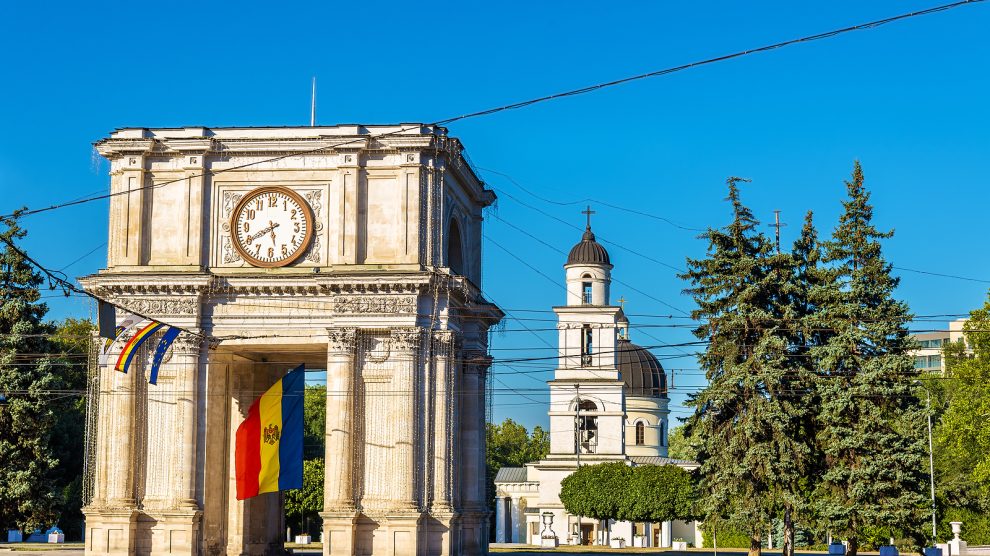Moldova this week votes in a key referendum on future EU membership that will decide the country’s future. But what advantages would an EU perspective bring the country?
Moldova, nestled between the European Union and Ukraine, faces a series of challenges. From the economy to slow judicial reforms and rapid depopulation, the country has been facing challenges it cannot tackle alone.
While there’s no silver bullet to overcoming these obstacles, a pro-EU vote at an upcoming referendum—set to held on October 20, concurrently with the first round of country’s presidential election—would certainly put the country on the right track.
- ‘Now is the time to invest in Moldova’
- What would a failed EU referendum mean for Moldova?
- Moldova’s ambitious targets for green energy
Moldovans are being asked a simple question: Do you support amending the Constitution with a view to the accession of the Republic of Moldova to the European Union? Incumbent president, Maia Sandu, is campaigning for a yes vote.
Opinion polls suggest that Moldovans will indeed vote for an EU future, and for Sandu herself to serve a second term.
The economy
Moldova remains Europe’s poorest country with a GDP per capita of around 7,000 euros, about a third of that of its neighbor Romania, an EU member.
Thus, the potential for economic progress that comes with European Union membership is undeniable. Since joining the EU in 2007 Romania’s purchasing power grew from 43 per cent to 78 per cent of the EU average.
Moldova’s economy depends heavily on agriculture. The sector employs more than a quarter of the workforce and generates 12 per cent of the country’s GDP. As Moldova would need to invest heavily in the sector to bring it on part with European standards, funds will be made available through EU’s common agricultural policy once Moldova becomes a member state.
Additionally, as highlighted recently by Moldova’s Economy Minister, EU candidate status would signal to investors that Moldova is a viable business partner.
The EU is Moldova’s biggest trade partner, accounting for 53.7 per cent of its total trade in 2023. For an export driven economy like Moldova’s accessing EU markets quickly and cheaply is crucial.
Infrastructure
Moldova has the worst roads in Europe. This leads to road fatalities and economic losses due to bad infrastructure.
Potential EU membership would mean that the country can access more funds to improve its infrastructure.
Better infrastructure helps connect supply chains and efficiently move goods and services across borders. It also improves the quality of life as infrastructure creating opportunities for employment and improving access to healthcare and education.
Demographics
Research by The Institute for Development and Social Initiative (IDIS) Viitorul based in Chișinău has revealed that astonishingly, the Republic of Moldova is returning to population levels not seen since 1950—its population has decreased by 1.5 million people over the past 30 years.
The most recent census, dating back from 2014 ,puts the country’s population at 2.8 million, down from 4.3 million recorded by the 1989 census.
Moldova has been losing its population rapidly, faster than that any other country occupied by the Soviet Union. Almost a third of its population has left over the past three decades in search of better job prospects abroad.
As the sluggish economy and job market have proven to be the main culprits in determining Moldovans to move abroad, creating better economic conditions at home through EU investment could help stop or even reverse the trend.
Stronger institutions
Moldova’s president has pledged zero tolerance towards corruption, and receiving support from Brussels is essential in achieving this goal. As an EU member Moldova will benefit from mechanisms to help safeguard rule of law making sure the country’s institutions remain robust and uphold democratic standards.
EU membership would also provide Moldova with more options to fight off any external interference. Recently, Moldova’s Chief of Police Viorel Cernăuțeanu said that there’s significant proof Russia is using bribes, hybrid warfare and disinformation, the likes of which Moldova has never seen before in its push to sway public opinion during the upcoming referendum.
Moreover, European Commission Vice President Vera Jourova said that Russia is now trying to falsely portraying a lack of popular support for European integration. The European Parliament has also strongly condemned Russia’s interference in the upcoming referendum and has taken steps to fight disinformation.
A member of the European Parliament for the European People’s Party, Rareş Bogdan, introduced an amendment that secured 45 million euros in funds earmarked to help counteract the spread of fake news in Moldova. Moldova has also set up a centre aimed at combating discrimination.
EU membership is Moldova’s ticket to growth. This journey will be as challenging as it is necessary. However, without popular support and substantial turnout at the referendum (turnout must reach 30 per cent in order to be valid), this journey might come to an abrupt halt—with devastating effects for the future of the Republic of Moldova.
Unlike many news and information platforms, Emerging Europe is free to read, and always will be. There is no paywall here. We are independent, not affiliated with nor representing any political party or business organisation. We want the very best for emerging Europe, nothing more, nothing less. Your support will help us continue to spread the word about this amazing region.
You can contribute here. Thank you.


